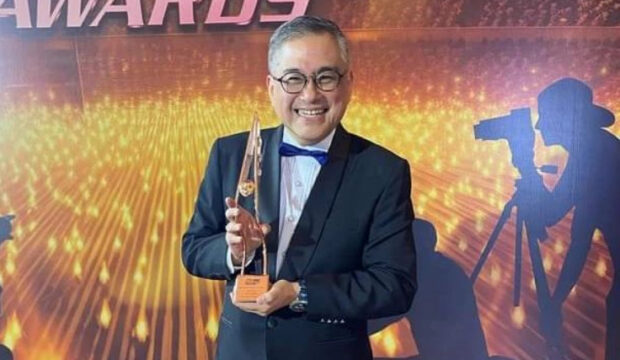Nothing comes easy. Know the basics and then expand,” is the advice broadcast journalist Rico Hizon, the first Filipino to receive the best factual presenter trophy from the Asian Academy Creative Awards (AACA), gives to those who want to take a similar path.
At the AACA ceremony held in Singapore in December, Hizon was declared grand winner, besting six other news presenters from Australia, Singapore, Hong Kong, India and Indonesia.
Only a week ago, Hizon also bagged the best news anchor/presenter at the 28th Asian Television Awards (ATA) held in Vietnam. He won over seven other Asian nominees.
Big break
“I was also a frustrated journalist in the beginning. It took me about three to four years to get my big break in news. You have to be patient. If you want to become a real journalist, you have to work your way up,” said Hizon, who is currently senior anchor and director for news content development at CNN Philippines.
“Nothing comes easy in this world. You have to be multifaceted. You have to know how to write and how to edit. You must be able to do a lot of things, especially now that those who are in demand are digital content creators and writers,” he added.
“The most basic is that you have to know how to write across the board—local, news, sports, business, lifestyle and entertainment. You shouldn’t be limited to a specific content. You should be able to do anything. In my case, I was able to find my niche in business and financial news. When you eventually find your niche, you should expand. If you can’t do so many things, you will really have to learn,” said Hizon, who anchors CNN Philippines’ flagship late-night news program “The Final Word.”
“I’m very happy with CNN, because I have a very good team of young and good journalists. I’ve trained them with the best practices that I’ve learned from overseas. I always tell them that when we write stories, they have to be tight, concise and direct to the point. Our reports have to be short but informative,” he began. “A couple of my producers have already moved on from the show and are now working in other international networks. I’m really very proud of them. One is now with the Columbia School of Journalism.”
Difficult guests
Hizon started his broadcast career with GMA 7 in the 1980s. He then joined CNBC Asia in 1995, and transferred to BBC World News in 2002. Seventeen years later, he joined CNN Philippines.
“You will always encounter difficult guests, whether from the government or the opposition. You can never take sides, and if you feel it’s one-sided, you ask, ‘Why is it this way? What should be done?’ That has been my training in my 35 years in broadcast journalism. Always ask the tough questions, and constantly remind yourself that you cannot express your personal views or show your biases,” Hizon pointed out.
In his acceptance AACA speech, he thanked “the men and women of CNN Philippines because without them, there will be no award. It was also important to thank the guests, because they make up the content of the show. I also pointed out that my job is to present the news, which has to be balanced and unbiased, and fair. That’s the most important thing to our viewers and listeners—that we deliver the truth.”
The AACA “honors excellence across multiple platforms including television, feature films, digital, mobile, streaming, and any other emerging technologies.” It is an annual event held in December, recognizing creative excellence across 17 nations in the Asia-Pacific.
Meanwhile, the ATA is also an annual event that “recognizes programming and production excellence in the Asian television industry,” with winners chosen in 56 categories across news, documentaries and current affairs, kids and animation, entertainment, drama, technical, digital, as well as works in acting and directing. INQ
